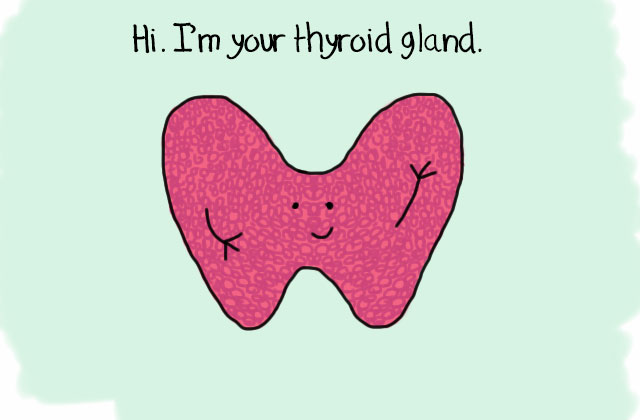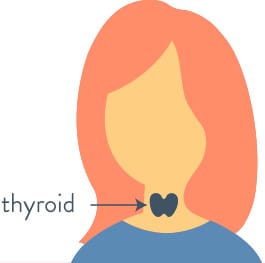
Your Thyroid & Anxiety
My thyroid has been causing me grief since I was a child, when my neck first starting looking puffy—like I had been stung by bees on both sides. My swollen glands protruded so much that doctors used to stop my mother on the street and tell her I needed to see an endocrinologist right away. Since then, I have been to countless hormone specialists (that’s what endocrinologists actually are) and even doctors who treat only thyroid issues. It turns out that cute little butterfly gland in my neck has caused me more than grief—it has been one of the main causes of my anxiety disorder.
Before we go into the thyroid-anxiety connection, let’s first discuss what the thyroid is and what it’s supposed to be doing in your body. Simply stated, the thyroid is a butterfly-shaped gland located in your neck above the collarbone. The thyroid’s job is to produce hormones that regulate lots of bodily functions such as temperature, metabolism, and protein synthesis. Thus, the thyroid affects just about every organ in the body. It makes sense, then, that, if your thyroid is malfunctioning, you will experience a systemic response.

One way the thyroid can malfunction is when it doesn’t produce enough hormones to serve your body’s systems. This is called hypothyroidism or, more commonly, underactive thyroid, which causes the body to slow down. Some of the typical symptoms of hypothyroidism include fatigue, weight gain, lowered libido, reduced cognitive functioning and slowed reflexes. If you have suffered from anxiety or particularly depression, these symptoms may sound familiar. Another symptom of hypothyroidism is anxiety, which seems logical when you consider that one of the thyroid’s duties is to regulate the neurotransmitters serotonin and norepinephrine—the brain’s feel good chemicals. If the thyroid is underperforming, those neurotransmitters will be less available to the brain, which is a direct cause of anxiety and depression.
Another way the thyroid can malfunction is when it produces too much hormone—when it is overactive. This is called hyperthyroidism which speeds the body’s systems up. Symptoms include rapid heart rate, increased blood pressure, insomnia, shaking, and weight loss. Doesn’t this sound like an anxiety attack? Well, trust me, having hyperthyroidism is like being in a constant panic. In fact, panic attacks are another symptom of the disorder!
A third way the thyroid can malfunction is called Hashimoto’s Thyroiditis, which is an autoimmune condition whereby the thyroid is attacked by your own body’s immune system. The constant onslaught of antibodies causes the thyroid to break down and greatly inhibits its ability to function, which, in turn, brings about anxiety and depression for some of the same reasons mentioned when we discussed hypothyroidism.
So here’s what’s tricky about thyroid disorders: they are frequently undiagnosed or mistaken for mental health issues, thus leading to improper treatment. According to the American Thyroid Association, approximately 20 million Americans suffer from thyroid disorders, a full 60% of whom may not even be aware of their condition! Given this information, it should not be a surprise that doctors often overlook the thyroid as a possible culprit in the development of anxiety disorders.
Here’s what you need to know:
- Women are much more likely to suffer from thyroid dysfunction than men, and the risk increases as we age.
- Your doctor can order simple blood tests to determine how your thyroid is functioning; if you have anxiety, you may want to request the thyroid panel. MAKE SURE YOUR DOCTOR DOES MORE THAN JUST THE STANDARD TSH (THYROID STIMULATING HORMONE) TEST—I HAVE OFTEN HAD A “NORMAL” TSH RESULT EVEN THOUGH MY THYROID IS COMPLETELY OUT OF WHACK!
- In order to get an accurate picture of what your thyroid is up to, you should have the following tests: TSH, T3, T4, Reverse T3, and Free T4. If you suspect you may have an autoimmune issue (or if you already have other autoimmune diseases), you can also request a thyroid antibody test.

- There are medications developed specifically to treat thyroid disorders. You may find that if you treat the underlying condition (thyroid), your anxiety will decrease significantly.
- Make sure you have your thyroid physically examined by your doctor. This means he/she will feel your neck area for lumps and enlargement. You should also be asked to do the swallow test while the doc is touching your thyroid.
- If you are diagnosed with a thyroid disorder, go to an endocrinologist for a second opinion BEFORE YOU BEGIN TAKING ANY MEDICATION. I would share with you my horror story, but I don’t want to make you [more] anxious!

Bev Maunus
I got the bloods tests . TSh’S are fine but thyroid is very high numbers. Long story decided to change my diet to see if I could do it naturally without medicine. Got bronchitis
Ended up in ER. dr have me a steroid shot and now in full blown panic for 6 weeks. Haven’t had any anxiety in many many years.
Went to a psychiatrist she has prescribed Zoloft and klonopin. I am scared to taken them becomes of how I reacted to the steroid shot. It’s been 6 weeks of awfulness. I showed psychiatrist the thyroid test numbers – she said they are still within normal range. I could use your wisdom on taking the meds?? I was FINE before the shot!!!
Lisa Feit
Thank you for this very thorough explanation. I was recently diagnosed with Hashimotos but I have always suffered from anxiety and depression. I will now do these blood tests and consult an endocrinologist!! Thank you so much!!
Shelli Herbert
Great info! I have had thyroid issues for over 25 years and was finally recently diagnosed with Hashimotos. It has been a long 25 years of constantly changing meds due to my numbers being very out of whack all the while dealing with the anxiety and depression that endocrinologist don’t treat or for the most part even acknowledge. Keep up the great work gals, you are educating SO many with your info!! Much appreciated!